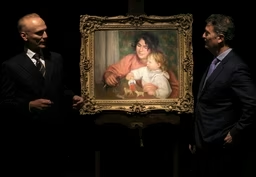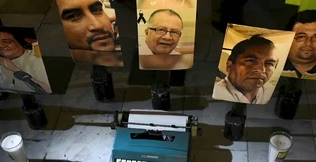
New film explores use of psychedelics to treat combat PTSD
Clip: 11/2/2025 | 7m 11sVideo has Closed Captions
New documentary explores use of psychedelics to treat combat veterans with PTSD
For many veterans, the battle doesn’t end when they come home. The invisible wounds of combat, like PTSD, can leave some feeling withdrawn or isolated. A new documentary, “In Waves and War,” follows a group of former Navy SEALs as they find healing through an unconventional tool: guided psychedelic therapy. Ali Rogin speaks with the film’s director and one of the Navy SEALs featured for more.
Problems playing video? | Closed Captioning Feedback
Problems playing video? | Closed Captioning Feedback
Major corporate funding for the PBS News Hour is provided by BDO, BNSF, Consumer Cellular, American Cruise Lines, and Raymond James. Funding for the PBS NewsHour Weekend is provided by...

New film explores use of psychedelics to treat combat PTSD
Clip: 11/2/2025 | 7m 11sVideo has Closed Captions
For many veterans, the battle doesn’t end when they come home. The invisible wounds of combat, like PTSD, can leave some feeling withdrawn or isolated. A new documentary, “In Waves and War,” follows a group of former Navy SEALs as they find healing through an unconventional tool: guided psychedelic therapy. Ali Rogin speaks with the film’s director and one of the Navy SEALs featured for more.
Problems playing video? | Closed Captioning Feedback
How to Watch PBS News Hour
PBS News Hour is available to stream on pbs.org and the free PBS App, available on iPhone, Apple TV, Android TV, Android smartphones, Amazon Fire TV, Amazon Fire Tablet, Roku, Samsung Smart TV, and Vizio.
Providing Support for PBS.org
Learn Moreabout PBS online sponsorshipFor many veterans, the battle doesn't end when they come home.
The invisible wounds of combat, like post-traumatic stress disorder can leave some feeling withdrawn or isolated.
Tomorrow, a new documentary premieres on Netflix, entitled In Waves and War.
It follows a group of former Navy SEALs as they confront their trauma and find healing through an unconventional tool, guided psychedelic therapy.
This is just one of those points in medicine where I've got to have the courage.
to jump medicines you right to the crest and you fall off.
Ali Rogan spoke to the film's director John Schenk, and one of the Navy SEALs featured in the film, Marcus Capone.
Thank you both so much for being here.
Marcus, um, the beginning of the film is you and some of your fellow team members talking about the trauma that you experienced not only on the battlefield, but interestingly, well before you all joined the military.
Tell me about that.
You know, I think from the film and the themes that come out of the film that I think a lot of this started potentially when we were, you know, at young ages, child, you know, 4 or 5 years old, 10 years old.
It ' s something I think we've never talked about.
And I think having traumatic experiences at a young age is potentially what forces us to go into certain careers as a special operator or other high risk or I would say protector type fields and for us it was special operations, and it's something that uh if you ask any one of us, we would never look back.
We would never do something different.
We would do the exact same way, but you take childhood trauma, you mix it with some wartime trauma, transition trauma, maybe some traumatic brain injuries and you have a very difficult, uh, mental health issue that's, um, very difficult to treat through traditional approaches to care.
And John, we hear in the film a team member saying that he wished he had just lost his arm completely when he was injured rather than have to deal with the more difficult feelings of kind of worthlessness when he was unable to join his, um, his brothers in the field.
What have you learned in making this film about the difficulty of dealing with those psychological scars of war.
Well, in the film, you meet these three amazing guys, right?
Marcus Capone, Mattie Roberts, who I think you're quoting, and DJ Shipley.
they find purpose in their life in the SEAL teams.
They find Brotherhood.
They find love.
They find acceptance, they find a reason as DJ says, to get out of bed each morning, swing feet out of bed.
When they get injured, whether it's physical, you know, like literally losing a a limb or mental, a brain injury or something like that, and they can't go back out there anymore.
That's a huge change in their lives, something that is almost impossible to adjust to without the help of your friends and community and family, and let's talk about how you started down that journey, Marcus.
You had hit some dead ends with, with traditional treatment and as a bit of a last ditch effort you try this compound called iboga.
It's an experimental, uh, psychedelic.
What is Ibogen?
And tell us about your experience with it.
Yeah, Ibigen is considered a psychedelic drug.
It's a Schedule 1 in the US, so individuals have to travel outside in places where they're legal.
Schedule One, by nature, uh in the US is supposed to have no medical benefit.
It's supposed to have a high risk to abuse.
I began as the complete opposite.
Um, we're seeing now with um just through our program over 1200 individuals that we've treated and gotten better.
Um.
they come to us, uh, with substance abuse issues, and they stopped drinking or they stop their narcotics if they're um if they're addicted to opioids, for instance.
This is a clinician guided treatment that is um monitored by nurses and, you know, doctors and individuals go in there with um really the the intent to heal, heal from, you know, wounds of war, heal from traumatic brain injury, heal from childhood trauma, really whatever it is.
Marcus, we see in this film some really interesting great animation of these trips that you and your fellow team members go on, but how, how does this work?
How does I again contribute to the healing process.
It gets to the root cause of the issues that are affecting your everyday life.
Too many treatments put a band-aid fix on it.
Many of these antidepressants are really just covering up the symptoms.
Psychedelics get into your unconscious, so it takes potentially 5 to 10 years of psychotherapy, what a therapist or a psychologist is trying to get to in a few hours.
And that's just incredible.
The interesting thing about Iboga and Alley is that everybody that we talked to and we talked to dozens and dozens of retired Navy SEALs who've done this treatment, describe a very visual experience, a life review that they describe kind of like a movie or a slideshow.
and just as a filmmaker it was like we were kids in a candy store because we could go and we could animate those details of those experiences and put them on the screen for the audience to try to begin to understand this highly complex thing that a scientists are only beginning to understand.
You mentioned the work that you've been doing in this field.
So I definitely want to talk about vets, the organization that you and your wife founded to help connect veterans with this treatment.
Tell us about why you decided to really make this your life's work in such a, such a big way.
I was on the standard, you know, I guess standard treatment protocols that many of us coming back from overseas are on.
And so for me, 7 years of failed antidepressants, talk therapy, uh, too many brain clinics.
get frustrated.
And for this, this was a lifeline for me, and all we wanted to do is pay it forward.
We have funded in 6 years over 1200 individuals to receive the exact same treatment.
We can't meet the demand.
We're overwhelmed with applications.
I'd say we could accept one out of every 10.
Well, and to that point, John, I wonder what do you think needs to change on the policy front on this issue?
Who would have thought that right now the zeitgeist would be basically a pro psychedelic zeitgeist.
I think that the American public is ready for this.
We showed in waves in war to the Texas state legislature a few months ago.
They were poised to pass a bill that would that would funnel tens of millions of dollars into IBa research, which was successfully passed.
California has now followed suit.
North Carolina is on the cusp of doing the same.
Hopefully we'll have action at the federal level.
I think the film is part of a movement that involves people from many, many walks of life that are part of this new look at psychedelic medicine.
The film is in waves and war.
Marcus Capone, John Shank, thank you so much.
Thank you.
Thank you.
Federal workers struggle without pay amid long shutdown
Video has Closed Captions
Clip: 11/2/2025 | 8m 10s | Federal workers struggle without pay as long shutdown begins to affect more Americans (8m 10s)
A previously unseen Renoir masterpiece heads to auction
Video has Closed Captions
Clip: 11/2/2025 | 1m 58s | A previously unseen Renoir masterpiece heads to auction after rediscovery (1m 58s)
Slain Mexican journalists honored on Day of the Dead
Video has Closed Captions
Clip: 11/2/2025 | 3m 5s | Mexican journalists honor slain colleagues on Day of the Dead in Tijuana (3m 5s)
Providing Support for PBS.org
Learn Moreabout PBS online sponsorship
- News and Public Affairs

FRONTLINE is investigative journalism that questions, explains and changes our world.

- News and Public Affairs

Amanpour and Company features conversations with leaders and decision makers.
Urban Consulate Presents











Support for PBS provided by:
Major corporate funding for the PBS News Hour is provided by BDO, BNSF, Consumer Cellular, American Cruise Lines, and Raymond James. Funding for the PBS NewsHour Weekend is provided by...


